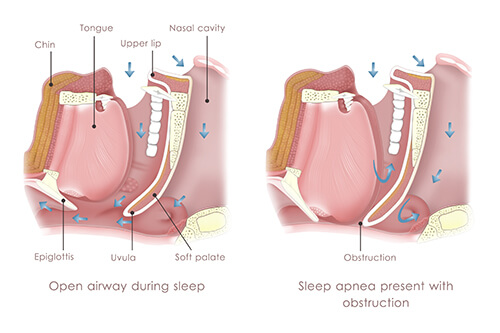
Upper Airway Resistance Syndrome (UARS) is a level of sleep-disordered breathing that is at a lower level than obstructive sleep apnea (OSA), but often a precursor to sleep apnea and has tremendous effects on one’s overall health. Patients who have UARS are often not overweight and don’t fit the physical profile of the typical sleep apnea patient. Also, not all patients with UARS suffer from snoring. Instead, their symptoms may sound more like heavy, labored breathing during sleep. UARS patients commonly have uneven bites, narrow dental arches, tongues that look large for the mouth, and jaws positioned too far back. In addition, the throat will seem closed.
The causes of UARS are similar to sleep apnea. It can be caused by a naturally narrowed air passage, loose fatty tissues of the throat collapsing back into the airway, or the position of the tongue (falling back) during sleep. The theory is that UARS causes chronic stress, which in turn never allows the body to get to the deep restorative sleep levels. Airway issues during sleep cause chronic stress on your body because of excess adrenaline and cortisol. Adrenaline and cortisol are stress hormones. These stress hormones can cause weight gain, chronic fatigue, fibromyalgia, IBS, and other somatic syndromes. The symptoms and side effects of UARS include:
If left untreated, UARS will continue to cause airway issues during non-REM sleep and worsen to sleep apnea.
One of the key differences between UARS and sleep apnea is that apneas (pauses in breathing) and hypopneas (decreases in breathing) are either absent or very low in patients with UARS. As mentioned, patients with UARS are often average weight. In addition, sleep apnea is twice as likely to affect men as women, while UARS can affect men and women equally. The fact remains that UARS is a serious condition that will worsen and progress into sleep apnea if left untreated.
The same treatments that are successful for sleep apnea are commonly used to treat UARS. However, UARS patients typically find it difficult to tolerate the CPAP machine, so CPAP therapy is not considered a first line of treatment for this disorder. The most successful treatments for UARS include:
For children, surgical treatments are usually the first line of treatment for UARS. As with sleep apnea, this could likely mean a tonsillectomy and adenoidectomy. Specialized orthodontic treatment is sometimes also recommended for children.
Led by Dr. Ruben Cohen, a Board Certified Oral and Maxillofacial Surgeon, our skilled team of sleep specialists, pediatric and general dentists, orthodontists, ENT surgeons, and anaesthesiologists have extensive experience in UARS treatment — in addition to other procedures and treatments for a wide array of conditions related to sleep apnea. For your added peace-of-mind, our facility is accredited by the American Association for Accreditation of Ambulatory Surgery Facilities (AAAASF), the Gold Standard in Accreditation. Our goal at NYC SleepWell, plain and simple, is to help you sleep well – and be healthy!